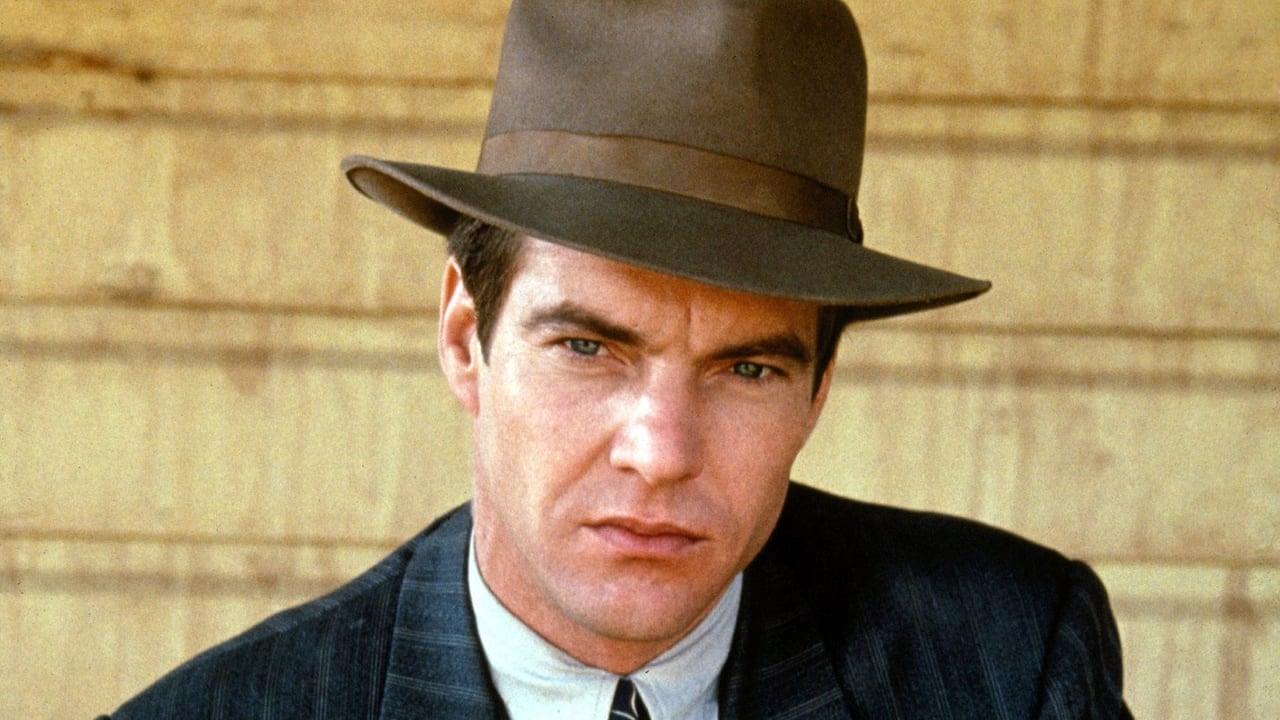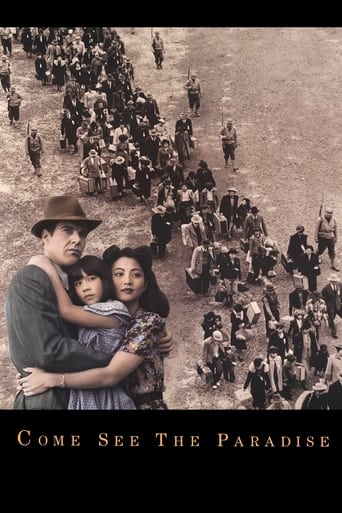

A brilliant film that helped define a genre
... View MoreI like movies that are aware of what they are selling... without [any] greater aspirations than to make people laugh and that's it.
... View MoreThis is a coming of age storyline that you've seen in one form or another for decades. It takes a truly unique voice to make yet another one worth watching.
... View MoreEach character in this movie — down to the smallest one — is an individual rather than a type, prone to spontaneous changes of mood and sometimes amusing outbursts of pettiness or ill humor.
... View MoreWhile I can't say I whole-heartedly hated this movie, I can't say I loved it either. In some ways, it attempts to make a difficult part of history more palatable for an American audience, and for this, I believe it deserves some commendation. However, to a large extent, the plotline of the film overshadows the historical events that it attempts to incorporate, and possibly even trivializes the hardships endured by people of Japanese descent during the 1930s and 1940s. The movie itself is centered around a cliché, star-crossed love story, leaving the majority of the historical features of the film as bits and pieces that are seemingly tacked on to give the film its validity. More than half of the film is spent on (albeit, poor) character development and introduction of the main conflict. As a result, the parts of the film that deal with internment and other injustices faced by people of Japanese descent are framed inherently as secondary aspects of the story. Internment and relocation were used as plot devices. Tense racial and/or ethnic conditions within camps and society are played down to make Jack and Lily's love more plausible. In many cases, Nisei and Issei were faced with systemic and often violent anti-Japanese sentiments that posed threats to personal wellbeing. In the camps, conditions were unsanitary and, due to the material losses some people suffered when forced to leave their houses so quickly during the relocation process, many internees were not able to afford appropriate medical care. This aspect is largely glossed over in the movie depiction. While I can go on about the issues I have with this film, I do believe it does a decent job of highlighting some of the important aspects of this period of history. Through the plot, Parker addresses the paradox of citizenship and loyalty, as well as other injustices and racism faced by the Japanese community during the 1930s and 1940s. Before World War II, people of Japanese descent were prevented from receiving citizenship by US immigration policies, but during internment, these people were also asked to swear loyalty to the United States, effectively challenging their identity as either Japanese or American. Similarly, there is some mention of the racism experienced by Nisei and Issei during this time, but it is often more generalized and even misguidedly incorporated into the screenwriting itself. Come See the Paradise walks the fine line between being historically valuable, and unfortunately frustrating to watch. What it lacks in historical accuracy, it makes up for in typical, sappy, Hollywood romance. This film could not be confused with a documentary, but for those seeking an interesting movie to watch, this is a decent choice if taken with a grain of salt.
... View MoreCome See The Paradise is an insult to the experiences that Japanese Americans and millions of other interned people have experienced. The film depicts the unconstitutional internment of Japanese American citizens and immigrants during World War II, but only does so through the story of an interracial couple. While the film could have addressed the social conflicts that an interracial couple would have faced at the time (and too often still face today), it falls short of truly depicting the American hatred for Japanese immigrants during World War II. The film spends entirely too long on the relationship between Jack (Dennis Quaid) and Lily (Tomita Tomlyn), and far too little time on the ways in which internment affected Japanese people living in America during and after internment. Although this movie is not anything close to what it could have been, there is a certain amount of credit that should be given to the producers and directors for portraying the lives and struggle of Japanese-American citizens and immigrants in their most dire times. It is important to be able to represent and confront the atrocities that America has committed in the name of freedom, but this is not an entirely accurate representation. The film shows only a limited amount of struggle that the Japanese citizens underwent leading up to their internment. It seems that many of them are extremely willing to go away to these camps, selling their belongings and even refusing offers that are deemed too low for certain items. There is only a brief instance of despair before the family leaves for the camp when Lily tells the family to smash the record players. When they leave the platform and say goodbye to Jack, they seem hopeful that they would be seeing him extremely soon. Although this movie is not perfect by any stretch of the imagination, it does address a few meaningful aspects of camp life. The depiction of Mr. Kawamura's decline is quite representative of the way in which the camps and the country stripped away any sense of belonging and pride from the Japanese citizens and immigrants. Mr. Kawamura shows what the camp did to many and that there was little to live for once interned. Additionally, Charlie's rebellion against the American government demonstrates the struggles that many faced in their situation. Many faced the difficult choice of turning their backs on a country and a life that was all they knew, but were forced to do so because of the injustices that the American government was doing to them and their families. Finally, the scene in which Lily exclaims to a guard that the camp was nothing but an outdoor prison was particularly meaningful because it contradicts the American propaganda that the camp was a place that the Japanese citizens "wanted" to be. Although there are a few powerful scenes and narratives that are sprinkled throughout the movie, overall, it fails to be an accurate depiction of internment.
... View MoreThe unconstitutional internment of Japanese-Americans during WW2 is one of those little-known tragedies of history. I had never heard of it until I chanced upon this movie. And although it's not as great a tragedy, I consider it to be another one that this movie is also so little-known.But this is not a documentary, and although you might learn something, this movie should be appreciated as a work of art. Of course if you're looking for a feel-good, popcorn flick, you should probably look elsewhere, but when you're in the mood for a serious, dramatic work, come back to this one and bring a box of tissues.The movie follows the lives of the Kawamura family. The parents relocated from Japan and settled into a thriving Japanese community in California known as Little Tokyo where their children were born. Their family, home, business, and friends are all there.Meanwhile in Boston, Irish-American Jack McGurn has been caught up in some illegal union activities. Disillusioned by his cohorts' lack of principles and fearing arrest, Jack flees the city to stay with his brother until he can sort out his life. He finds a temporary job working as the projectionist in the movie house run by Mr. Kawamura. Jack learns Japanese songs from the movies, befriends his employer's son, and falls hard for his employer's oldest daughter Lily, played by a luminescent Tamlyn Tomita. Jack's and Lily's love story is interwoven with the rest of her family's experiences in the internment camps. Jack, who found it hard to turn his back on the plight of the common working man even for the sake of peace in his family, is later forced to leave his wife and child to endure the camps while he is drafted into the army to fight against the countrymen of his in-laws, people he has come to love and respect.There is some violence in this movie, but it is neither incessant nor gratuitous. There is also some strong language and sexual content, but that too is neither incessant nor gratuitous. There are also some heart-wrenching moments, and some moments that will make you question what it means to belong to a country and to love a country as your own. I would recommend that parents and teachers screen this movie for themselves before showing it to any minors.But it is the love that holds the movie together. It is the love that makes the painful moments hurt so much, but that same love makes those moments endurable. Jack and the Kawamuras are flawed human beings making mistakes as they try to make their way through the world, but they are decent, caring people trying to do the right thing, and they love each other. It is easy to root for these people, to hurt with them when things go wrong, and to feel joy in their triumphs. The occasional moments of humor help lighten the mood.The costumes and production design are so well done it's easy to forget that this is a modern movie and that it wasn't filmed in the age it depicts. The script is top-shelf, and the entire cast is uniformly excellent. Dennis Quaid succeeds in making Jack simultaneously bullheaded but capable of great sensitivity, and he keeps his character human and relatable. Tamlyn Tomita gives an award-worthy performance of the calibre that even if she had never done anything else in film or television, she should be counted a success as an actress. It's all but impossible to avoid falling for her Lily right along with Jack. She might be better-dressed and look more glamorous in other works, but this must be the work she prefers to be known for.I highly recommend this movie to anyone capable of appreciating dramatic works, anyone with an interest in history, or anyone who enjoys watching a talented cast work together to produce one of those once-in-a-lifetime films. If I could only pack a shoebox's worth of movies to watch for the rest of my life, this would be one of them.Come See the Paradise. I think you'll be glad you did.
... View MoreWell, I recently experienced "Come See the Paradise" with Dennis Quad. The movie tells the often overlooked and not widely known story of Japanese Americans before, during and after WWII. This film was incredible to say the least, the characters very well drawn up and telling a simple love story beautifully. The performances are memorable and one can feel the sense of conflict in these characters. At times I was actually nearly brought to tears, a rare thing for me (the only movies that have ever made me cry are "Godzilla vs. Destroyah", "I am Legend", "Pokémon 2000" ,I was like seven, "Rodan" and "Schindler's List"). The encampment of Japanese-Americans is often overshadowed by Pearl Harbor and the Holocaust, but this film shows it how it really happened. The struggle of loyalty, patriotism and freedom all are called out in this movie quite nicely, the director just telling it how it is, you know? The story is sad one that finally lives up to its title, although I couldn't really enjoy it the first time around with my history teacher treating us like five year olds! I only wish it had a scene of the Atomic bomb being dropped on Nagasaki or Hiroshima. It would of helped audiences understand the atrocity of using such a weapon on defenseless civilians.
... View More